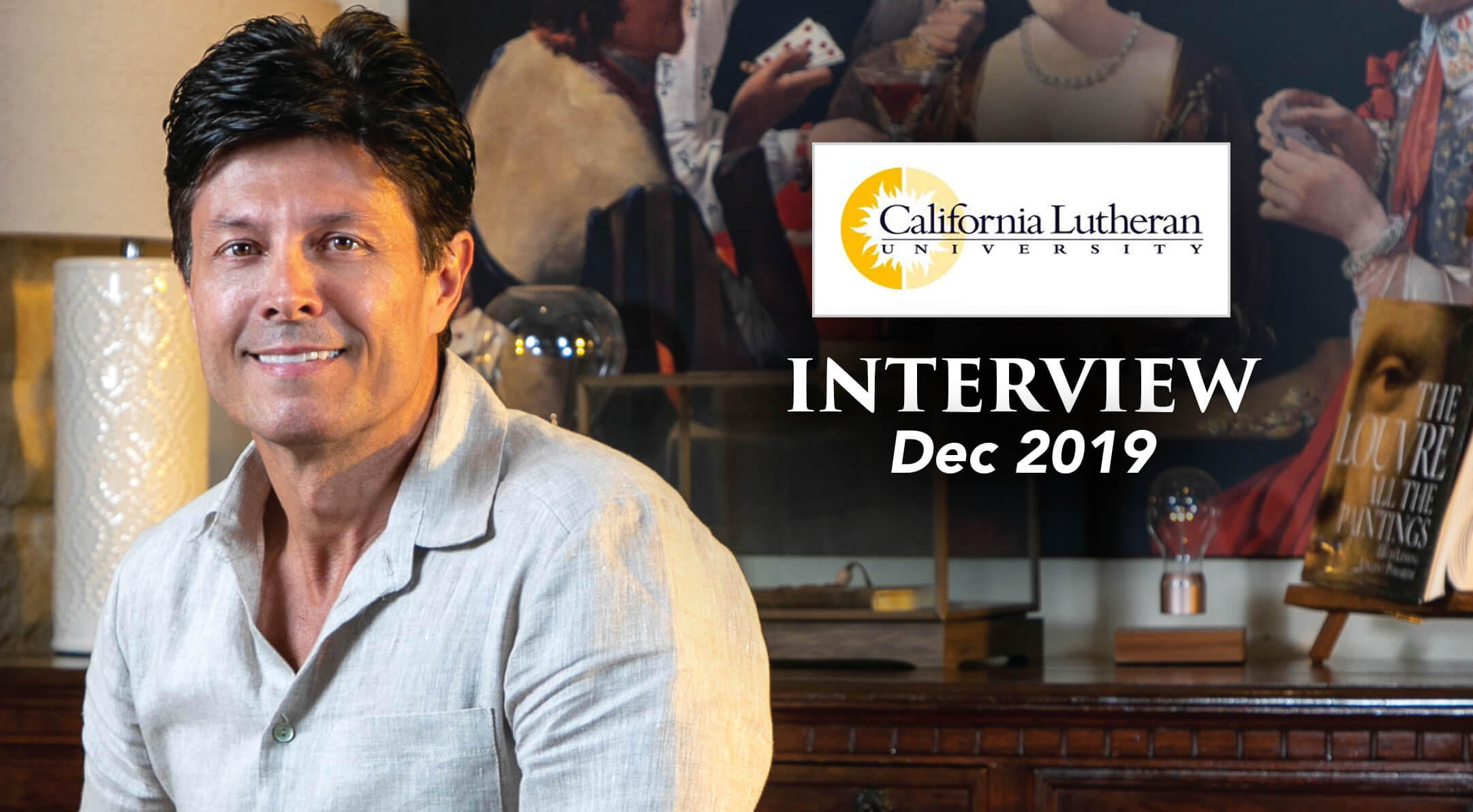Cal Lutheran Magazine Article Dec 2019

Ivan graduated from California Lutheran University and the school wanted to feature what its alumni have been doing over the years. Here’s a great article on Ivan’s career, how he got started and his next adventures.
THE MARVELOUS MR. AMODEI
The illusionist and onetime marketing major has embarked on a nationwide tour, the most ambitious phase of his career in confounding the senses and transforming the world for audiences.
BY TONY BIASOTTI / / LEAD PHOTO BY BRIAN STETHEM ’84
While in college, Ivan Amodei had a job waiting tables in Thousand Oaks at the Velvet Turtle, a nowdefunct fine dining chain. Amodei and his fellow student waiters made a pact: “We all decided when we graduated college we were going to quit,” he said. “I thought it would be too easy to stay. A lot of people with degrees did stay and wait tables.”
The marketing major left the restaurant as promised and went looking for work, until it dawned on him that none of the jobs on offer were better than the one he still had: magic.
Amodei started practicing card tricks and other illusions when he was around 5 years old, and by the time he finished college he was performing at the Magic Castle in Hollywood and working parties.
“Just fooling around with my magic, doing corporate events, I was making more money than some of these corporate jobs I was interviewing for,” Amodei said. “I thought, ‘I don’t have a family, I don’t have kids. Nobody’s going to starve except me if I fail, so I might as well give this a whirl.’”
Twenty-seven years later, Amodei is in a small class of entertainers: a professional stage magician who tours the country playing before crowds of hundreds or even thousands. In 2016, he appeared on “Penn & Teller: Fool Us” and fooled the famous hosts, with a trick that is still a part of his act. Amodei debuted his new show, “Secrets & Illusions,” in the summer of 2019 and started a nationwide tour in September that will last into 2020.
There is a large worldwide community of magicians, but most are hobbyists or part-timers, said Michael Gerson, an associate professor of graduate psychology at Cal Lutheran and an amateur magician himself, though he’s never met Amodei or seen him perform.
Gerson studies the use of magic in therapy, and has a paper under review at a psychology journal on magic’s potential as an intervention tactic for children on the autism spectrum.
“Magic really pushes the limits of our thinking,” he said. “We’re using our normal senses to try to understand an experience, and it fools us; our senses fall short. There are limits or contradictions to the information we take in through our sense. From a psychological point of view, it’s important because it makes us question how we know things. It makes us reflect on our sense of certainty about the world.”
In a way, it’s remarkable that stage magic like Amodei’s retains its appeal, Gerson said, since in the world of 2019 we can watch seamless digital illusions in movies and immerse ourselves in fantasy worlds through video games.
The distinct appeal of watching and pulling off live illusions was something Amodei understood as a child. He now lives with his wife and their 13-year-old twins in the Somis area, north of Camarillo, California, on a property that includes a 30acre lemon orchard.
He was born in a small town in Sicily and moved to New York City at the age of 2, when his parents and his uncle, all hairdressers, opened their own salon. When he was about 5 years old, his parents had a party, and one of the guests performed a few magic tricks. Amodei was hooked. He found a magic shop in his Brooklyn neighborhood, and the owner taught him card and coin tricks and let him read books on tricks and techniques. Before long, he was demonstrating magic for the customers.
When Amodei was a teenager, his family moved to Scottsdale, Arizona, and then to California. He attended Thousand Oaks High School, went to work at the Velvet Turtle, and moved out on his own after his parents divorced. He took a year off after high school and enrolled at Cal Lutheran. “I lived in an apartment right around the corner from campus,” Amodei said. “I made a lot of friends there and I really loved it.”
With the goal of becoming a plastic surgeon, he started college as a pre-med student. But as he soaked up more magic and hung out at the Magic Castle, he found himself less interested in medicine. After graduating with a marketing degree, he made that fateful decision to pursue magic, without a mentor to guide him or even a model for his style.
“There wasn’t YouTube or anything when I was a kid. I didn’t have a lot of access to magicians. The magic store was my biggest access,” Amodei said. “When I was a teenager, David Copperfield was on TV, and that was about it. I don’t think there was anybody specifically who taught me. It was kind of a selfled journey.”
In contrast to the crowds who buy tickets to see him, he did most of his magic early in his career for people who had no idea who he was: salespeople at a corporate retreat, or guests at a wedding. He had to perfect his technique, and he had to learn how to win a crowd. “Those are the toughest crowds, the crowds where the one person who hired you for the event is excited, but nobody else really cares,” he said. “I had to have my skills in all different aspects of magic, because you never know what’s going to happen. … How do you get 300 people who aren’t interested in you to be interested in you? You have about 10 seconds to get their attention. It’s almost like street performing.”
Amodei started to create his own act and take it on tour. At first, he said, his magic wasn’t much more than sleight-of-hand tricks: “I’m going to change the ball from red to blue; I’m going to make the coin disappear.”
But 13 years ago, after his children were born, his act changed. He started trying to build illusions with meaning. His new show has a theme, which he sums up onstage in an aphorism that is frequently, though incorrectly, attributed to Mark Twain: “The two most important days of your life are the day you were born, and the day you find out why.”
His illusions connect people in the audience to one another. Gerson teaches his graduate psychology students at Cal Lutheran a few magic tricks they can do with children, to help their young patients relax and acclimate to a therapy session. The students have a sense of childlike wonder when they’re first shown the trick that tends to dissolve when they’re shown how it’s done.
For Amodei, a sense of wonder persists after he saw his first magic tricks and started to delve into their secrets. He’s someone who figured out early in life why he was born. “I don’t know if I’ve arrived exactly, but I’m doing what I really love to, and I’m going to keep doing it,” he said.
For upcoming Secrets & Illusions shows, visit ivanamodei.com.
IVAN FOOLS PENN & TELLER FULL VIDEO

ON SEPT 16TH, 2016, Ivan appeared on the Season Finale of Penn & Teller Fool Us on the CW Network.
Performing in front of Penn & Teller was an exciting experience and a unique opportunity to showcase an audience favorite illusion on national television.
FOOLING these two seasoned and masterful performers Penn & Teller was simply the cherry on top of the sundae. It took them over 7 minutes to deliberate (not shown in edited version). Check out the judges interrupting Penn with their decision.
IVAN’S MOST DANGEROUS ILLUSION

I am introducing my newest addition to the show – A Sharp Sense.
Russian Roulette is not a game for the weak of heart, and neither is this illusion. Many magicians have been badly hurt, and have even injured others with their version of this risky game. Not only is this more dangerous than any before it, but a surprising twist leaves you wondering if what you just witnessed was real or imagined.
Guests selected to play the game, have run off stage, cried, screamed and emotionally broken down. If you are the lucky person chosen to participate in the gamble, there is no turning back. You will have to see this all the way through until the terrifying end.
Good luck.

 Email
Email
